Sep 10, 2025 – European Lecture Tour (3) Amsterdam
Hello. Today marks the third lecture of the European tour, held in Amsterdam, the capital of the Netherlands.
Sunim woke up at 2 AM, completed his morning practice and meditation, and prepared for the live broadcast of the Weekly Dharma Assembly.
At 3 AM Paris local time, 10 AM Korean time, the live broadcast of the Weekly Dharma Assembly began. After all Jungto Society members entered the video conference room, they recited the Three Refuges and the Heart Sutra, then watched a video showcasing the activities of Jungto practitioners over the past week.
After the video ended and the assembly requested a Dharma talk with three bows, Sunim gave his greeting.
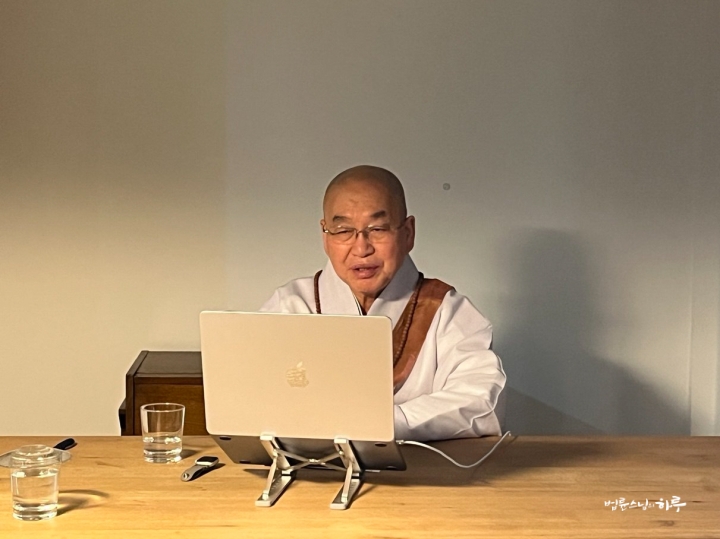
“I am currently in Paris. After completing the opening ceremony for the 10th 100-Day Prayer, I departed Korea that evening and arrived in London, England. After giving a Dharma Q&A in London, I moved to Paris yesterday and gave a Dharma Q&A with French interpretation. Last night, after giving a lecture for Korean residents, I returned to my accommodation after 11 PM. The current time here is 3 AM. I’m in a state where my eyes are closing from sleepiness. (laughter)
Yesterday in England, the morning temperature dropped to 7 degrees Celsius, making it quite chilly. I packed light thinking it was summer, but Europe is already well into autumn, making me feel the cold. Paris is also very cool with clear weather, reminiscent of deep autumn. After the Weekly Dharma Assembly ends, I’ll immediately take a train to Amsterdam to continue the lecture tour.
Since we held the 100-Day Prayer opening ceremony a few days ago, I believe you all have been practicing diligently this morning without fail. As this 100-Day Prayer is the final one of the 2-1st 1000-Day Practice, let’s work together to continue our practice without missing a single day.”
Sunim then had conversations with those who had submitted questions in advance. During the hour, Sunim was able to speak with four people.
In my married life, I feel that communication with my husband is not equal and that my thoughts and feelings are not sufficiently respected. What perspective should I have?
I’m curious about Sunim’s thoughts on whether a politician’s moral virtues and abilities can coexist.
I’d like to distribute mini eco-bags printed with “Jungto Dharma School” as a promotional tool to citizens. Would that be okay?
Besides awareness, are there any recommended practices for maintaining equanimity?
After answering all the questions, an hour had passed. They agreed to meet online again next week during Sunim’s Southeast Asia tour and concluded the Weekly Dharma Assembly.
After a simple breakfast, Sunim left the accommodation at 5:20 AM and headed to Gare du Nord to catch the train.
After completing the boarding procedures, Sunim greeted the members who came to see him off and took a commemorative photo.
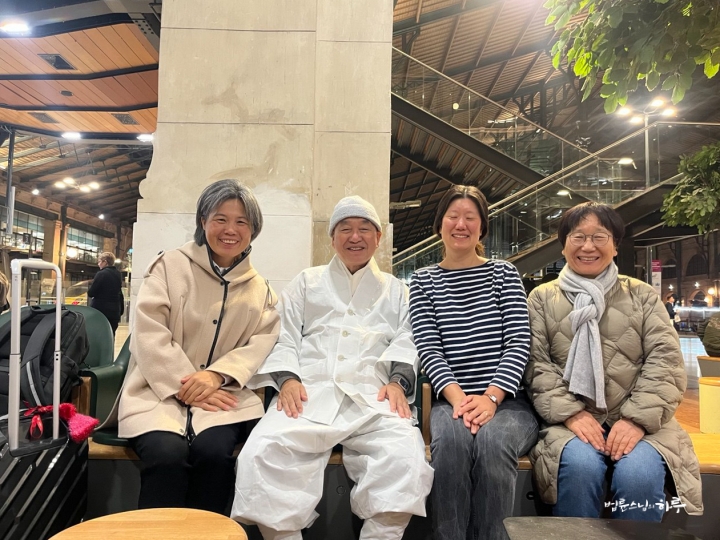
The train departed Gare du Nord at 6:22 AM heading for Amsterdam, Netherlands. After traveling for 3 hours and 26 minutes, it arrived at Amsterdam Schiphol train station at 9:48 AM.
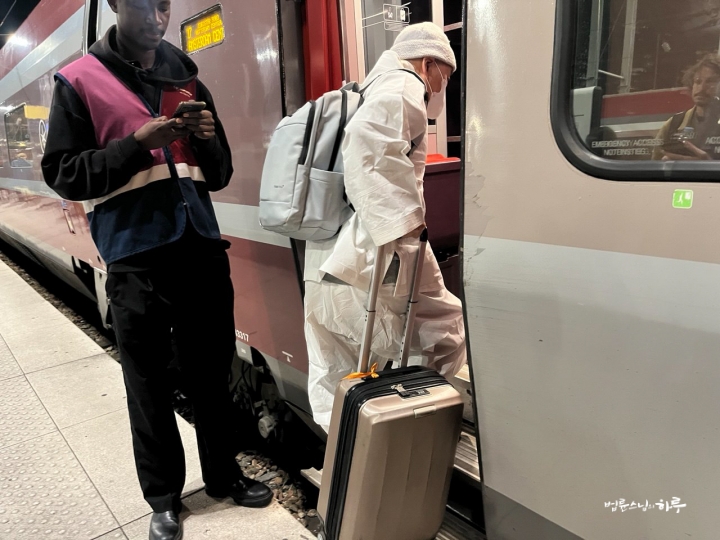
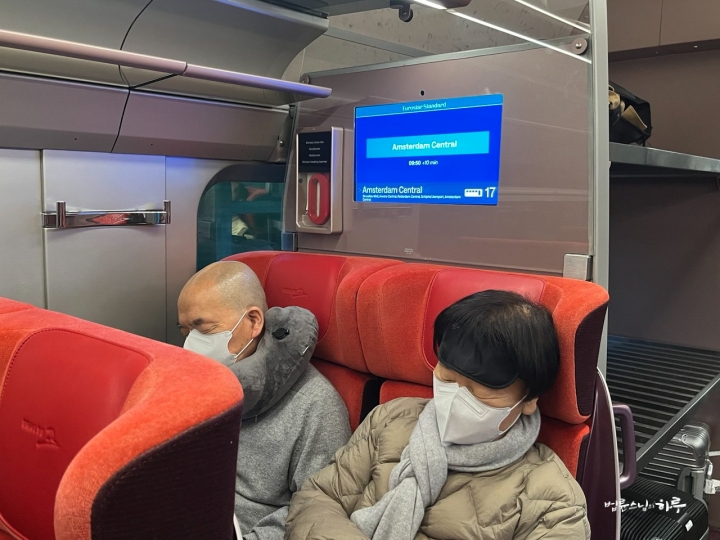
When Sunim got off the train, Jungto Society members residing in Amsterdam warmly welcomed him.
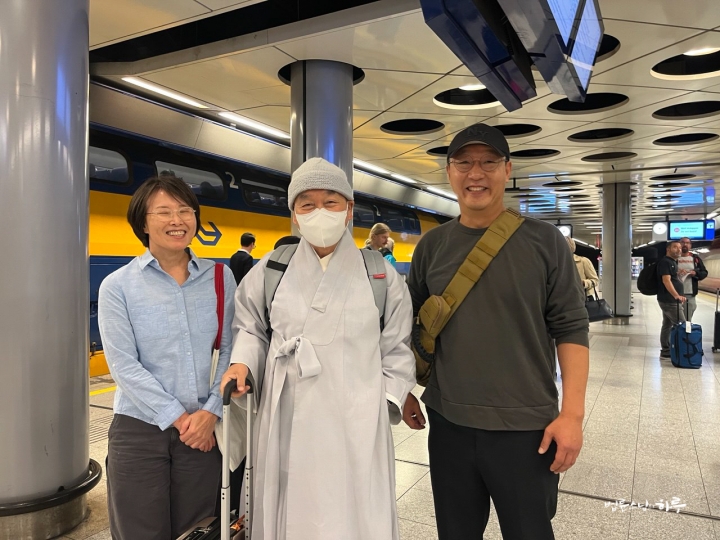
Venerable Myohai, who had participated in the INEB Jungto Society study program a few years ago, also came to the train station to meet Sunim at the arrival time. As soon as Venerable Myohai saw Sunim, he knelt on the ground and bowed.
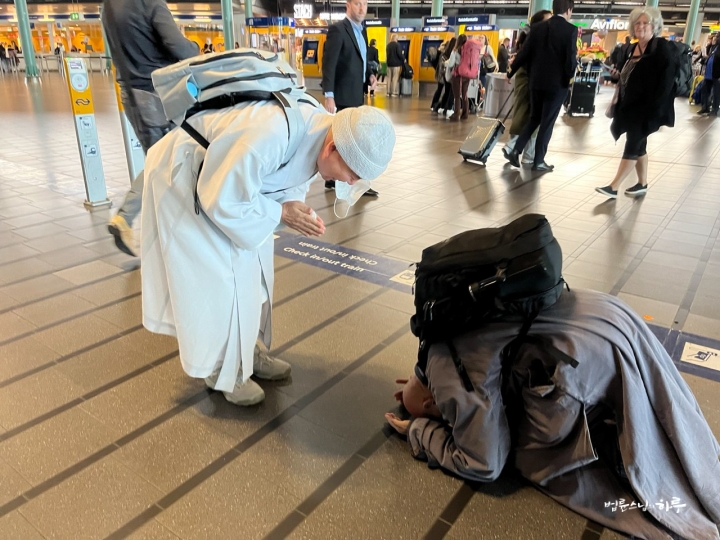
After exchanging warm greetings, they moved together to Ms. Kim Mi-kyung’s home. Upon arriving at Ms. Kim’s residence, the volunteers who had prepared the Amsterdam lecture came to greet Sunim with three bows.
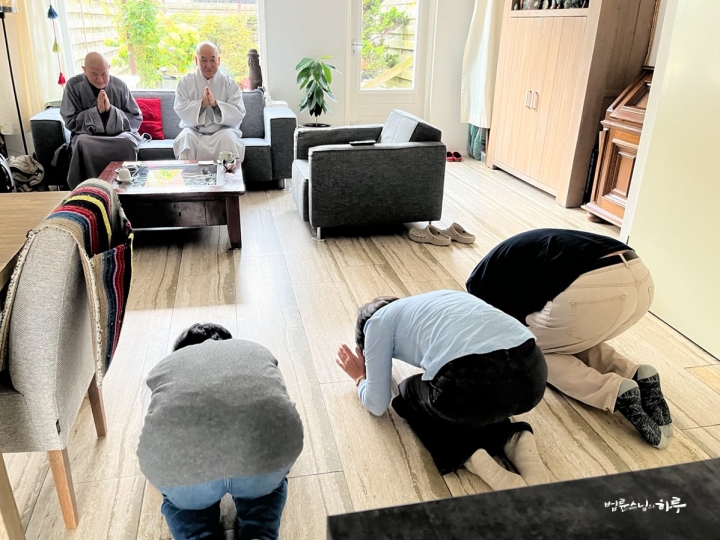
Sunim had lunch with Venerable Myohai and spent two hours discussing the international meditation event being promoted by the World Meditation Association.
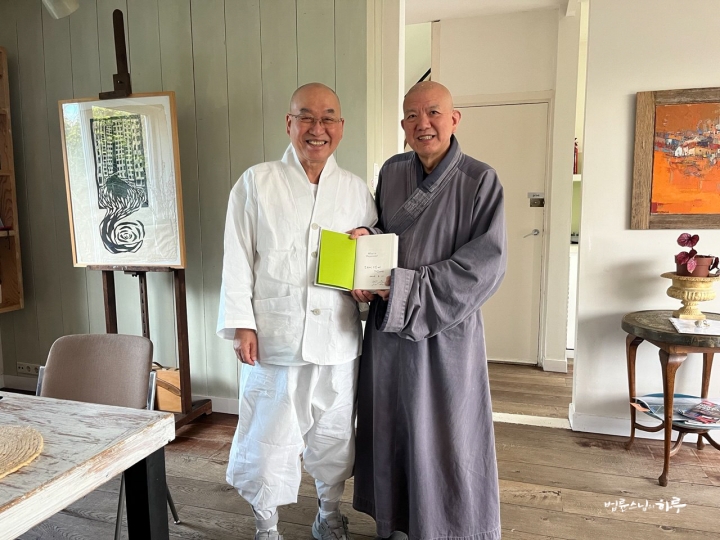
First, they gathered opinions about the World Meditation Day event to be held on December 21st, the winter solstice. This day has been designated as World Meditation Day by the UN, and they agreed that the entire world would enter meditation simultaneously at noon Greenwich Mean Time. In Korean time, meditation would be conducted for 15 minutes starting at 9 PM, and they decided to promote the event in advance so participants worldwide could join online through Zoom and YouTube.
They also discussed the 2nd Meditation Symposium to be held at the spring equinox next March. The purpose is to invite meditation experts from various religions including Buddhism, Christianity, Islam, Hinduism, and Judaism to share their traditions and find common ground. They agreed that the World Meditation Association and Jungto Society would co-host, with the World Meditation Association handling planning and Jungto Society managing event operations, and concluded the meeting.
Afterward, Sunim moved to his accommodation and had a video conference with Venerable Myohai, the Jungto Society International Cooperation Team, and the Dharma Teacher in charge of the International Division. They shared the content just discussed about the meditation symposium and decided to discuss and decide within Jungto Society’s internal discussion units.
After having dinner at 5 PM, he departed for the lecture venue at 6:15 PM.
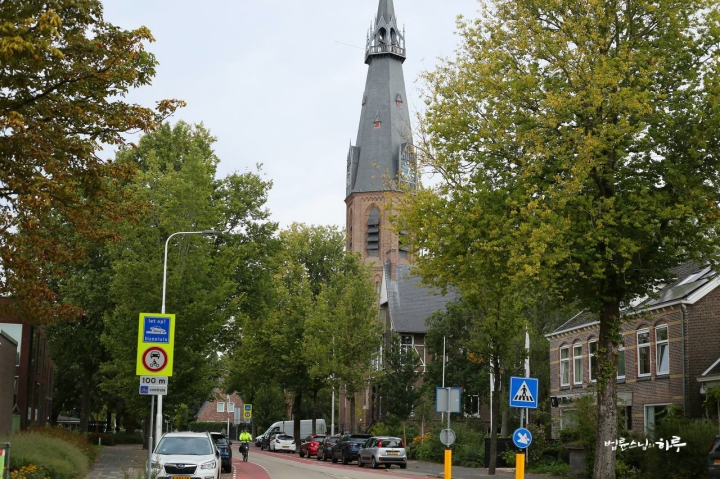
Today’s lecture was held at the Noorddam Center located in Amstelveen. This multipurpose space hosts various international conferences and cultural events, and today it hosted Venerable Pomnyun Sunim’s Dharma Q&A.

When Sunim arrived at the venue, volunteers welcomed him from various locations. Korean residents from all over the Netherlands were also arriving at the lecture hall one after another.

With about 180 Korean residents filling the venue, at 7 PM, a video introducing Sunim was screened. When the video ended, Sunim walked onto the stage to great applause.
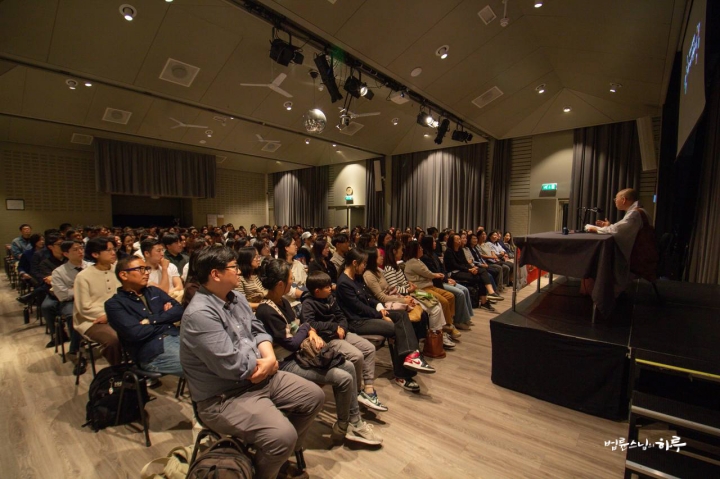
Sunim gave his greeting with a bright smile.
“Whenever I gave lectures in Düsseldorf, Germany, two or three people would always come from Amsterdam. They would ask, ‘Why don’t you come to Amsterdam?’ So this year, I’ve come to Amsterdam like this. My first visit to Amsterdam was in 2014. That year was called the ‘World 100 Lectures,’ where I visited every place where Korean residents lived without exception. I toured about 30 cities in Europe, and the place with the smallest audience was Lisbon, Portugal. About 11 people came. Since the total number of Korean residents in Portugal at that time was only about 100, it was actually the highest percentage.
When I came to Amsterdam then, I also stopped by the Yi Jun Memorial Hall in The Hague. When the memorial hall opened, I attended the opening ceremony with Cardinal Kim Soo-hwan and Reverend Kang Won-yong. When I visited in 2014, I briefly toured downtown Amsterdam, but that memory is now faint. I’m very happy to come back today and meet all of you.
Since the surroundings here are fields, it doesn’t feel like Amsterdam but rather like being in the countryside. Nevertheless, you all found your way here well. Was it inconvenient getting here?”
“No.”
A Forum Without a Theme, A Lively Discussion Created by the Audience
“Dharma Q&A is not a lecture format with a predetermined topic. It’s a place to freely share various life stories and worldly affairs that we experience while living. There are no restrictions on topics. If you ask about marital conflicts or children’s issues, it becomes life counseling; if you ask about the universe or life, it becomes a science class; if you ask about history, it becomes a history class. Also, if you ask about peace on the Korean Peninsula, the conversation may continue into political, social, and diplomatic issues. So the Dharma Q&A is not led by me as the speaker, but by you, the audience. Therefore, you shouldn’t complain, ‘I’m interested in Korean social issues, but why do you only deal with life problems?’ You can ask questions about topics you’re interested in. You don’t have to ask questions either. You can share opinions or continue the conversation.
In Buddhist terms, this kind of gathering is called ‘야단법석 yadanbeobseok’ (野壇法席). In Western terms, it could be called a ‘town hall meeting.’ The important thing is that I don’t decide the topic; we create it together. So don’t complain on your way home after the lecture; ask about any topic you want and let’s create a conversation together.
Sometimes someone asks, ‘All kinds of questions come up, but what if someone asks about something Sunim doesn’t know?’ If a question I don’t know comes up, it’s the simplest to answer. Because I can just say, ‘I don’t know.’ Since Dharma Q&A is a conversation, there’s actually no such thing as a question I don’t know. In a Q&A format, I might not know, but in Dharma Q&A, there’s no such thing as an unknown question. If someone asks about factual content, I can answer ‘I don’t know’ or ‘Please search on the internet.’ What’s important here is to continue the conversation rather than finding answers.
You don’t need to think that Sunim must know a lot to do Dharma Q&A. When talking with friends, you don’t necessarily need to know a lot. Sometimes just listening is enough. For example, someone might share their troubles saying, ‘I’m having a hard time because my husband is having an affair,’ or ‘I’m troubled because I’m seeing another man while I have a husband.’ When you hear such stories, you shouldn’t go outside and gossip, ‘That woman is seeing two men at the same time.’ This is a place to share human anguish, not to evaluate ethics or morality. Would a woman seeing two men simultaneously be troubled or not? Of course she would be troubled. Being in such a relationship inevitably brings many afflictions. So I don’t approach it with ethical standards, but only from the perspective of ‘How can I help relieve that anguish?’ I hope you’ll keep that in mind as you engage in conversation.”
Then anyone could raise their hand and have a conversation with Sunim. Over two hours, nine people asked Sunim various questions about their life concerns. The first questioner said they felt anxious about taking a path others don’t take and asked Sunim for advice on how to steady their mind when doubts about the future arise.
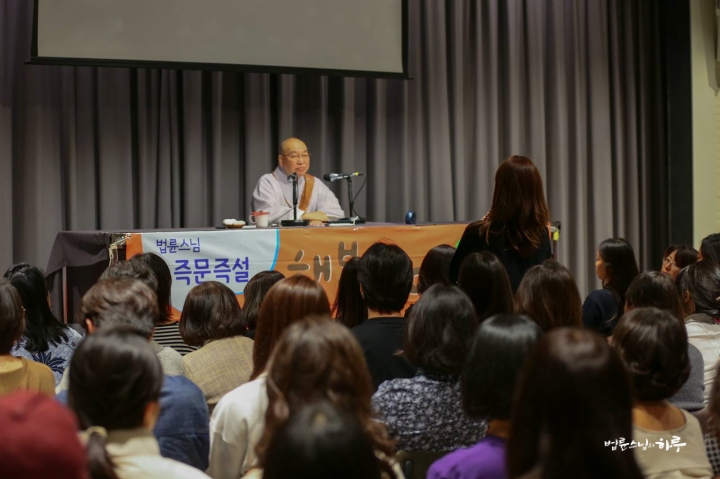
On a Path No One Has Taken, How Can I Walk Boldly?
“If you’re going alone, you can only do well. Because ‘doing well’ or ‘doing poorly’ comes from comparison. If there’s no one to compare with, doing well or poorly doesn’t exist. If two people walk a mountain path together, you can compare who went first or who climbed higher. But if you walk the mountain path alone, whether you go up, come back, or take a side path, there’s no one to compare with, so there’s no evaluation standard. So if you’re taking a path no one has taken, you’re unconditionally doing well. Whatever you do, you’re doing well. (laughter)
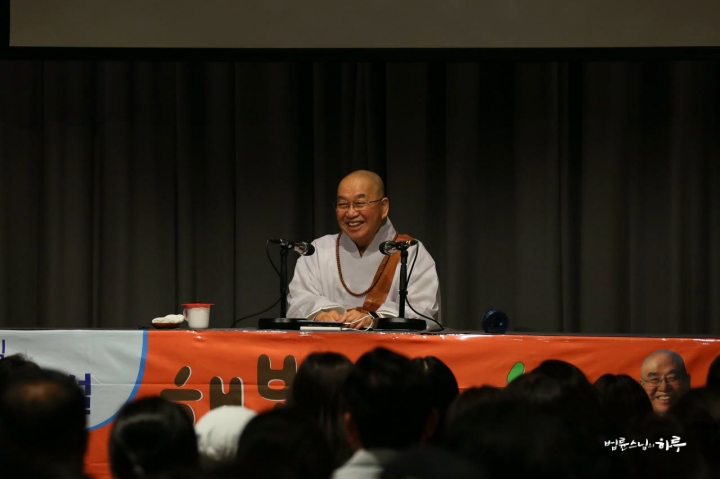
Taking a path no one has taken means pioneering. Pioneering naturally comes with difficulties. Like when first making a path on a mountain. However, when first making a path, the phrase ‘took the wrong path’ doesn’t apply. There’s only how much path you make. Even if someone later improves that path, they don’t say ‘the previous path was wrong.’ They just say ‘found a shorter path.’
So just go with peace of mind. No one can evaluate you. Actually, the path I walk is like that too. What I do is a path that monks haven’t taken yet, so it’s difficult to evaluate within Buddhism. However, society can compare it with similar activities, so there’s just a little evaluation. Like that, what’s important is that you’re walking your own path that no one can evaluate. So just walk boldly.”
“Yes, thank you. I found great comfort in your words.”
Questions continued to follow.
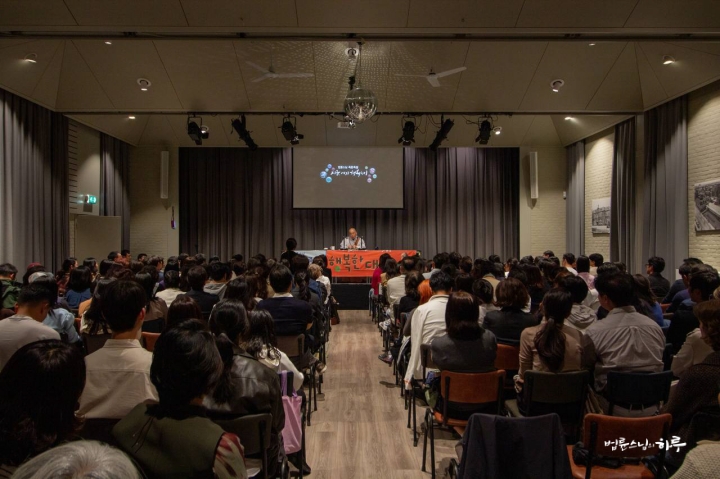
I seem to expect unconditional love from the person I love. How can I let go of the desire for my partner to become exactly like me?
Many terrible things like war and genocide are happening in the world right now. How should I maintain my mindset to avoid becoming helpless seeing this?
I’ve been dating my Dutch boyfriend for 8 years. I’m still not certain about him, but should I have a child?
Sometimes my desire to do well becomes an obsession that holds me back. How should I handle my mind then? What’s the difference between giving up and letting go of attachment?
Living in a capitalist society, my desire to help others is gradually weakening. What do you think about the idea that I need to succeed first to be good to others?
After my father’s suicide, I also attempted suicide. What thoughts should I have about death as I live?
Among the questioners was a 17-year-old student. He raised his hand high and courageously shared his concerns.
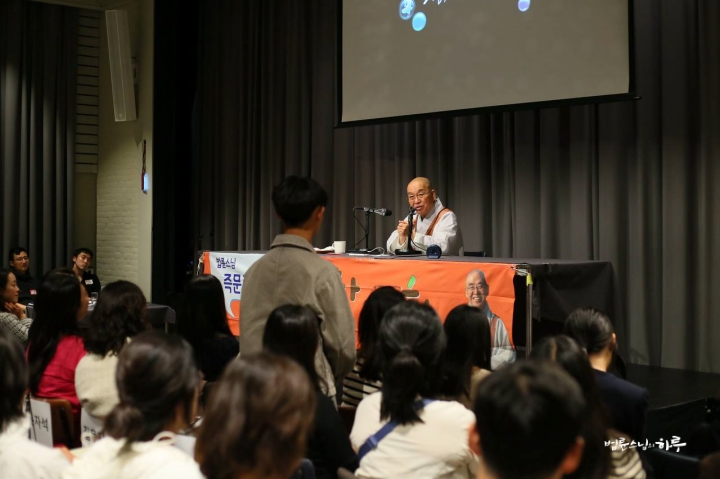
When My Parents’ Wishes and My Dreams Differ, How Should I Resolve the Conflict?
“Don’t you live with your parents?”
“The person next to me is my mother.” (Laughter)
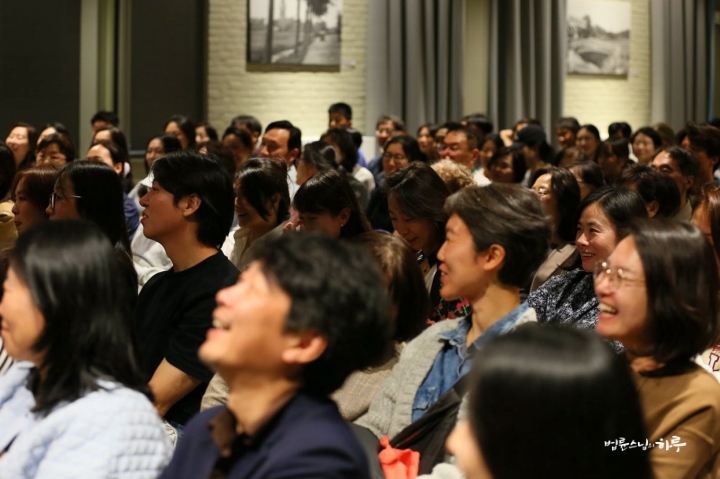
“So your parents want you to settle down and live well in the Netherlands, and you want to return to Korea. But if you go to Korea and get caught up in entrance exam competition and fail tests, you’ll want to come back to the Netherlands again, won’t you?” (Laughter)
“That’s why I plan to finish school here.”
“If you’re 17 now, are you in the first year of high school by Korean age?”
“I’m in the third year of high school.”
“Then are you planning to attend university in Korea or in the Netherlands?”
“I plan to attend university in the Netherlands.”
“Then there’s nothing to worry about at all. You still have more than four years until university graduation. Why are you already worrying about four years from now? Ask me again in four years. If you’re 17 years old now, you’re still a minor. As a minor, you can express your opinion, but the final decision is made by your parents as guardians. Is the age of majority in Dutch law 18 or 19?”
“It’s 18.”
“Then you’ll become an adult next year. When you become an adult, you can have conversations and reach agreements with your parents. If you can’t reach an agreement, the final decision rests with you. It’s a legally guaranteed right. In Korea, you become an adult at 19, and in the Netherlands at 18. So after becoming an adult, if you want to go to Korea, you can go. That’s not being unfilial. You don’t need to think, ‘Being filial means doing everything your parents want.’ You shouldn’t refuse unconditionally, but if you’ve listened to your parents’ opinions sufficiently and had conversations, the final decision is made by you as an adult. That’s not being unfilial; it’s your right.
If you continue to hand over your rights to your parents in the name of filial piety, you may be a good son in your parents’ eyes, but socially you’re your parents’ slave. Because your parents hold your rights. Do most parents want their children to be masters or slaves? Do you want your children to be slaves?”
“No.”
“But most parents want their children to be their slaves. Even if they live as masters outside, they want them to follow their parents’ wishes when they come home. The relationship between parents and children is a good connection for each other, but the ultimate rights as humans belong to each individual. Because each of us is the master of our own life. Of course, some people religiously surrender this right to God. They voluntarily declare, ‘I am a servant of God.’ It’s okay to surrender it voluntarily. You can also hand over your rights to your parents or spouse. But if you look at the natural ecosystem, it follows the ‘law of individual preservation’ where each being is responsible for their own life.
A mother hen protects her chicks when they’re young, but once they’re grown, she doesn’t care who takes them. Because each must protect their own life. So you don’t need to worry too much right now. However, you must have sufficient conversations with your parents. While having conversations, you can think, ‘Next year, the rights will come to me.’ You just need to keep your head down for one more year. (Laughter)
When that time comes, whatever decision you make is your freedom. You don’t need to be too conscious of your parents. If I come to give a lecture in this area again next year, you can ask again with the topic, ‘How should I exercise my rights? Should I stay in the Netherlands or return to Korea?’ After just one year, your parents will no longer be the final decision-makers but discussion partners. Remember that the final decision rests with you. So you don’t need to worry too much.”
“Thank you.”
“But what always comes with rights?”
“Responsibility comes with them.”
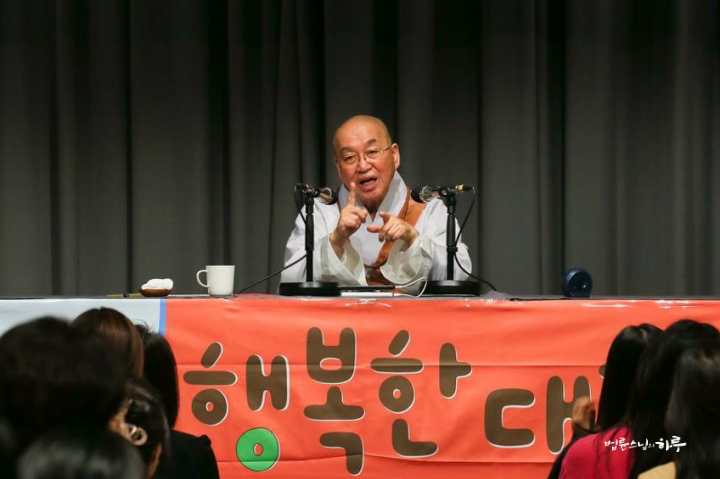
“Rights always come with responsibility. But looking at young people in Korea, they want to enjoy rights but don’t want to take responsibility. They want to study abroad with money from their parents, but they want to live as they please. That’s not right. Let’s say you received a scholarship from Venerable Pomnyun because you lacked tuition. Venerable Pomnyun would give the scholarship but set a rule saying, ‘You must maintain a B grade or higher,’ and if you don’t follow that condition, you can’t receive the scholarship. Similarly, if you receive financial support from your parents, you must accept your parents’ demands to some extent.
If you can get married without your parents’ help, you can marry whoever you want whenever you want. You should listen to your parents’ opinions, but even if they oppose, you don’t need to worry too much. Because once you’re over twenty, you have the right to marry on your own. However, if you want to receive support from your parents for things like housing deposits, wedding preparations, or congratulatory money, you must accept your parents’ wishes to that extent. This isn’t a matter of filial piety but a matter of interests. So you need to handle it wisely.
If you’re planning to receive your parents’ support, the two of you need to cooperate well and bow your heads to your parents somewhat. But if your parents’ opposition is strong and you’ve made up your minds to marry, the statement ‘We can’t marry because our parents oppose’ doesn’t hold. In reality, you’re struggling with the question, ‘Is this person worth marrying even if it means giving up my parents’ wealth?’ In other words, you’re struggling with interests.
For example, let’s say a woman pushes through with marriage despite her father’s strong opposition. It’s not an easy decision, but once she makes that decision, the man might start having second thoughts. Because among the reasons the man liked the woman, though not expressed outwardly, there might have been expectations about her wealthy family. But if parental support is cut off, the marriage loses much of its meaning. When the woman makes her decision, the man’s feelings might change immediately like this. Human relationships are this delicate.
Becoming an adult means not only gaining rights but also taking on responsibilities. If you borrow money, you must pay it back with interest, and if you don’t want to pay it back, you shouldn’t borrow money. However, some religions sometimes show attitudes of avoiding responsibility. There are religions that teach things like ‘If you pray, everything will happen as you wish,’ with logic similar to saying you can borrow money but don’t need to pay it back.
Isn’t it cheating to do bad things and then believe you can go to a good place after death by praying to God or Buddha? Believing that you can go to a good university by praying hard even though you can’t study well is like entrance exam fraud. If that were the case, it would mean God or Buddha is acting as an admissions broker. But socially, such fraudulent activities are prohibited. Yet religions sometimes teach this way openly. I don’t think this is the essence of religion.
For instance, let’s assume heaven exists and we want to go there. What should we do? We should act in ways worthy of going to heaven. The Bible clearly states the criteria for going to heaven. On the day of final judgment, the King will come and raise all the living and the dead, separate them as a shepherd separates sheep from goats, and say ‘You will go to hell,’ ‘You will go to heaven.’ The criteria are presented in six ways starting from Matthew 25:31.
Did you give drink when thirsty? Did you give food when hungry? Did you give clothing when naked? Did you provide care when sick? Did you welcome strangers? Did you visit those in prison? When people ask, ‘Lord, when did you ever experience such things?’ the Lord says, ‘Whatever you did for one of the least of these, you did for me, and whatever you did not do for them, you did not do for me.’ I think reading these words and living by them is what makes a true Christian. I don’t think just going to church and singing hymns makes one a Christian. Buddhism is the same. If you create causes, you receive effects, and if you ignore the effects of causes, that cannot be called Buddhist teaching.
So it’s not enough for you to think, ‘I can exercise my rights when I become an adult next year.’ You must know that responsibility always comes with it. If you want to live as you please, you must first become economically independent. If you sleep in your parents’ house and eat food your mother makes, you have to listen to some nagging too. If your parents provide room and board but you don’t want to listen to nagging, that doesn’t make sense. If you get a free room or free meals in exchange for listening to nagging, it’s economically beneficial. So you should gladly accept the nagging saying, ‘Yes, mother, I understand!’
This is different from being a slave. A slave has had their rights taken away, but in this case, you’re accepting it because it’s beneficial to you as the master. If it seems like you might be kicked out, you should wake up early in the morning to clean and help prepare meals. If you calculate how many hours you’d need to work part-time to earn room and board, listening to your parents’ nagging is much more efficient. In this case, it’s not being selfish but being wise. Becoming an adult isn’t easy. Many international students want to live according to their desires but don’t want to take responsibility. Wanting to act as you please while receiving parental support is not the right mindset.
Parents caring for their children until age 18 is an obligation. While it’s something to be grateful for, it’s not a debt that must be repaid. But support received after becoming an adult is like a debt that must be repaid. It’s just that no contract was written. That’s why when you call your parents, you should always start with ‘Thank you.’ Even if you have something you want to say, you should express gratitude for what you’re grateful for and complaints as complaints. You should know what you should be grateful for. With this perspective, the relationship between parents and children becomes smooth.
Many students in Korea want to study abroad but can’t because their parents won’t send them, while students who have come abroad have their own problems. (Laughter) It seems like the K-Pop trend these days makes you want to go to Korea even more, but even if you go to Korea, it’s better to go after graduating from university in the Netherlands. With your current mindset, it would be difficult to adapt in Korea, and it would be hard to get into a good university. Even if you have the opportunity to go to Korea later, you need to do your best here first.”
“Thank you. I understand well.”
After finishing the conversation, Sunim gave closing remarks.
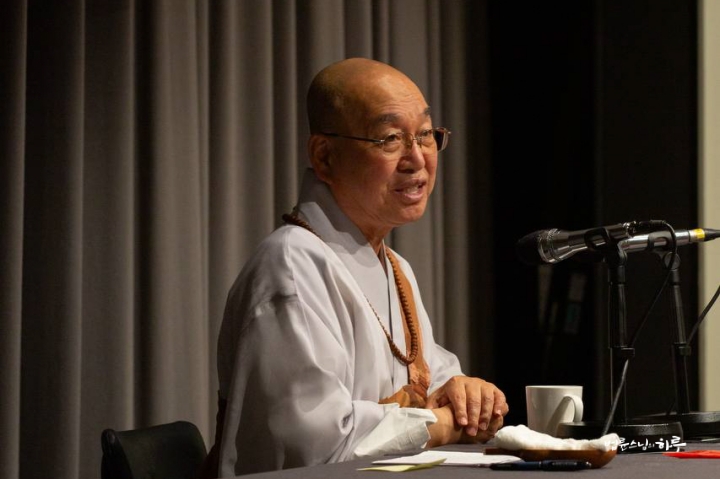
“There are many young people at today’s Amsterdam lecture. Is it because many students attended? Or is it because even older people look young? (Laughter) Even if I can’t visit every year, I’ll come again. You all came to the Netherlands to live better lives. So I hope you all live well as you intended.”
The lecture ended with loud applause. A book signing session began immediately. Many audience members lined up to greet Sunim and receive autographs.
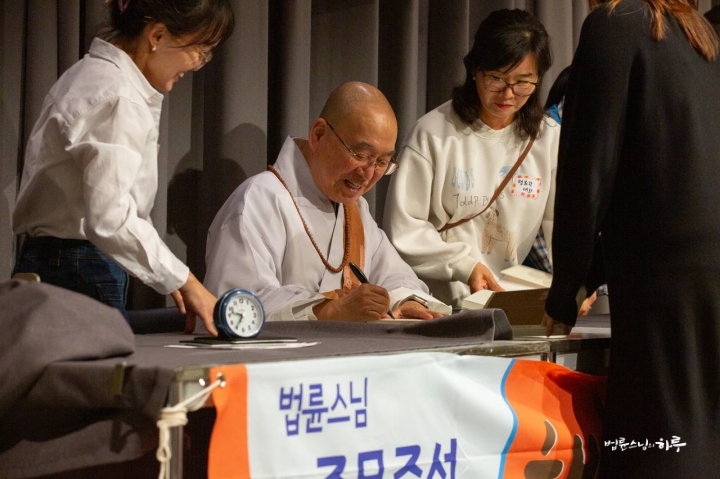
After all the audience members left the venue, Sunim took a commemorative photo with the volunteers who prepared the lecture.
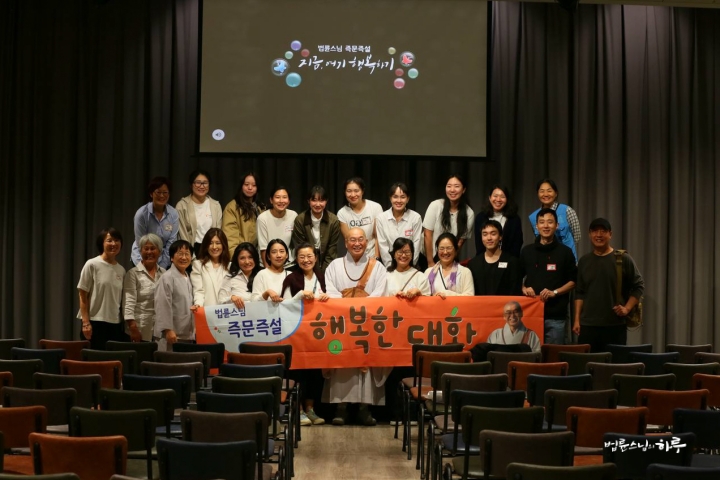
“Thank you all for your hard work.”
After expressing gratitude to the volunteers, Sunim headed to the accommodation. The volunteers had a mindful sharing session with Dharma Teacher Myodeok. Since there are only three Jungto Society members in Amsterdam, the rest of the volunteers met for the first time on site and worked together.
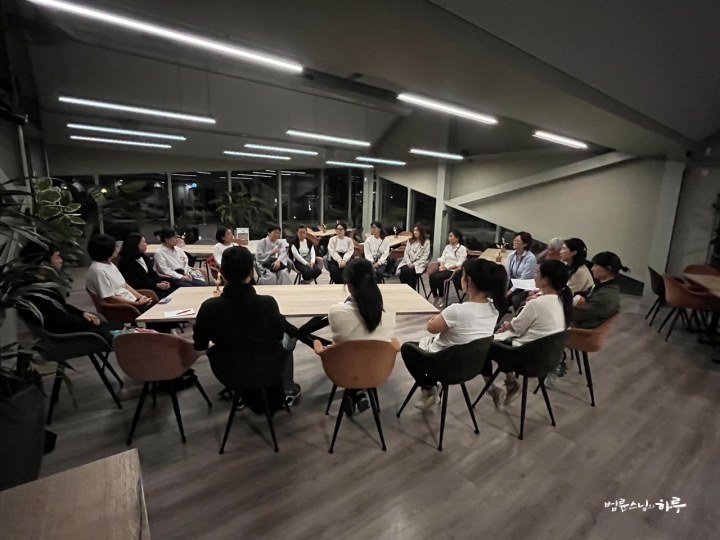
“I came to Amsterdam last year and spent a lonely year. But I’m really happy to meet Venerable Pomnyun Sunim in person and be with fellow practitioners like this. It was a new experience and meaningful time for me, and I was happy to share various perspectives with good people.”
“Ten years ago, my sister-in-law had a photo of Venerable Pomnyun Sunim as her KakaoTalk profile picture. I didn’t understand it well then, but through this lecture, listening to Sunim’s words directly, I came to understand my sister-in-law’s heart. I’m grateful and happy to be able to share such a good lecture together.”
“I’ve been in the Netherlands for seven years, but this is the first time I’ve gone out alone at night like today. It was a special and meaningful time to participate in volunteer work and do things under my own name, not as a mother or wife.”
The mindful sharing session was filled with warm energy as they shared and empathized with each other’s concerns.
After arriving at the accommodation, Sunim had a late dinner and went to bed.
Tomorrow morning, Sunim will travel by car to Düsseldorf, where he will give a Dharma Q&A lecture with German interpretation for locals in the afternoon, and another Dharma Q&A lecture for Korean expatriates in the evening.





